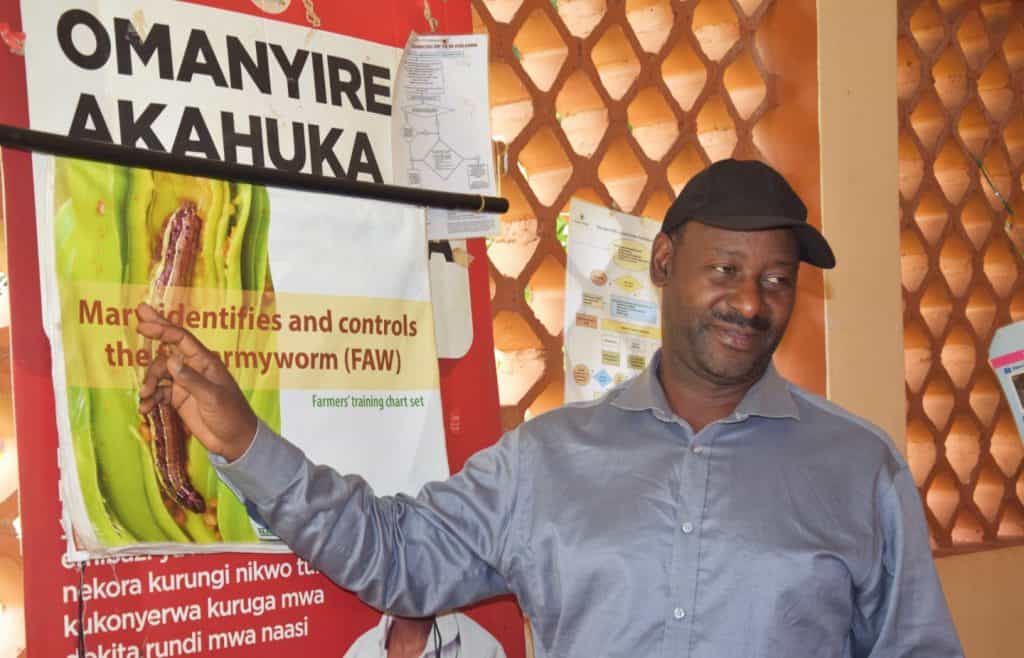Over 100 farmers in Kiryanga and Kabamba sub counties in Kagadi District have benefited from the National Agricultural Research Organisation – NARO’s program to fight the Fall Armyworm.
NARO through the FAW-ICIPE conducted research on FAW worm control and management. The farmer trainings were in Kagadi District particularly in the two most hit sub counties; Kabamba and Kiryanga.
90% of the farmers in the two counties specialize in growing maize but a big number of them continue to lament the effects posed by the FAW which has on notable occasions lowered their productivity.
Allan Bigirwa a proud maize farmer in Kiryanga sub county said his maize in the first season was hit heavily by the FAW to the extent that he did not even raise a single bag from the two acres he planted.
“Personally I thought they were the normal pests that attack maize and I sprayed severally but the pests just continued to eat my garden down until I lost hope,’’ a one Bigirwa mentioned.
His submission was not so different from that of many other farmers in the same area. Even those who might have heard some knowledge about feuding off the pest also raised the problem of shortage of access to recommended pesticides to help them out.
According to Mr. Solomon Kaboyo, a senior research technician, this is the main reason why NARO as a research institute reached out to the farmers to among others train them on how best they can contain the pest, what pesticides are recommended, where to find them, and what good agronomic practices they can observe in relation to fighting the armyworms.
Mr. Kaboyo raised that many farmers were either using pesticides not recommended by the Ministry of Agriculture and others were grossly mishandling the chemicals risking their lives.
He also highlighted many farmers even those who were spraying with the right pesticides were doing it at a wrong time.
He revealed the armyworms mostly feed in the morning and evening hours as a result, he tipped farmers to spray during that time because that is when the caterpillars are most active.
As well, he were urged them to apply the correct dose of the pesticides and also ensure the spray gets into the whorl, as this is where the older caterpillars hide most.
“Most farmers fear to incur extra costs, they run in for the cheap pesticides which cannot kill the armyworms. He tipped for the armyworms to die effectively, a farmers needs to make use of the right pesticides in addition to the good agronomic practices,” Kaboyo said.
In addition, he urged locals to consider planting improved maize varieties including Longe 10 H, WE-2114, Bazuuk, WE-2115, WE-3109 and WE-3106 because these are more resistant to the pests and diseases.
History/ Background
FAW scientifically known as Spodoptera frugiperda is a lepidopteran pest that feeds on large numbers of leaves and stems of more than 80 plant species, causing major damage to maize, rice, sorghum, sugarcane but also other vegetable crops and cotton.
It is a native of the tropical regions of the western hemisphere and was first witnessed in Uganda in 2016. The worm eats through crops for nourishment before its transformation into a moth.
By mid-2017, the fall armyworm had been detected throughout Uganda and estimations indicate that the infestation led to $192 million in maize crop losses alone. In some regions, farmers reported crop yield losses of up to 75% or even more.
With now approximately 22% of Uganda’s GDP coming from agriculture, it is true the biggest population relies heavily on successful agricultural harvests from particular crop yields, meaning any invasion of pests including FAW can mount serious consequences.



